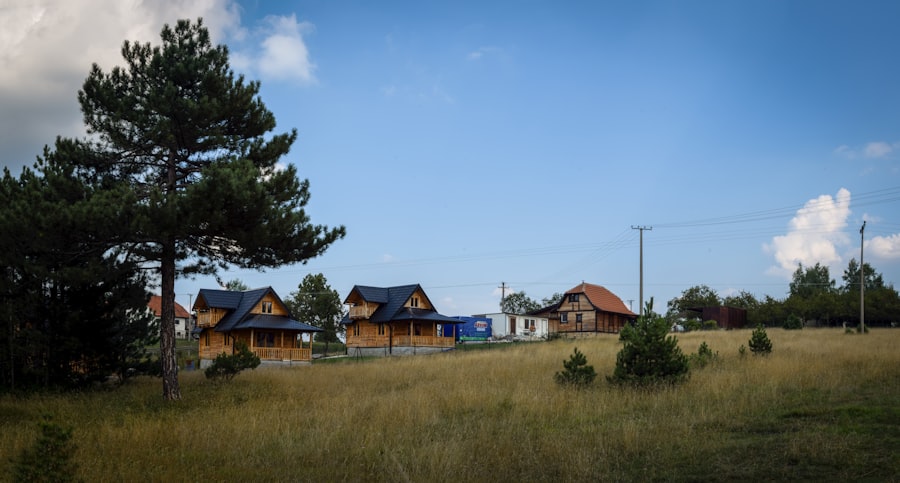Mobile home living has gained significant traction in recent years, appealing to a diverse demographic ranging from retirees seeking affordable housing to young families looking for flexibility. One of the most compelling benefits of mobile home living is affordability. Compared to traditional homes, mobile homes typically come with a lower price tag, making them an attractive option for those who may be priced out of the conventional housing market.
The cost savings extend beyond the initial purchase; mobile homes often incur lower property taxes and utility bills, allowing residents to allocate their finances more effectively. Another advantage is the flexibility that mobile homes offer. Many mobile homes are situated in communities that provide a sense of camaraderie among residents.
This can foster a supportive environment where neighbors look out for one another, creating a tight-knit community feel. Additionally, mobile homes can be relocated if necessary, providing homeowners with the option to change their surroundings without the hassle of selling a traditional house. This mobility is particularly appealing for individuals who may need to relocate for work or personal reasons, as it allows them to maintain their investment while adapting to new circumstances.
Key Takeaways
- Mobile home living offers affordability, flexibility, and a sense of community
- Research mobile home communities in your area to find the best fit for your lifestyle and needs
- Consider factors such as size, location, and amenities when choosing a mobile home
- Explore financing options such as personal loans, chattel mortgages, and FHA loans for purchasing a mobile home
- Take steps such as working with real estate agents and browsing online listings to find mobile homes near you
Researching Mobile Home Communities in Your Area
When considering mobile home living, thorough research into local communities is essential. Each mobile home community has its unique characteristics, amenities, and regulations that can significantly impact your living experience. Start by identifying communities within your desired geographic area, taking into account factors such as proximity to work, schools, healthcare facilities, and recreational opportunities.
Online resources, local real estate listings, and community forums can provide valuable insights into the available options. Once you have a list of potential communities, delve deeper into their specific offerings. Some communities may feature amenities such as swimming pools, clubhouses, and organized social events, which can enhance your lifestyle and provide opportunities for social interaction.
Additionally, consider the community’s rules and regulations, as these can vary widely. Some may have restrictions on pet ownership or require residents to adhere to specific maintenance standards. Understanding these aspects will help you find a community that aligns with your lifestyle and preferences.
Factors to Consider When Choosing a Mobile Home

Selecting the right mobile home involves careful consideration of various factors that can influence your comfort and satisfaction. One of the primary considerations is the size and layout of the home. Mobile homes come in various sizes, from single-section units to larger double-wide models.
Assess your space needs based on your family size and lifestyle. For instance, if you have children or plan to entertain guests frequently, a larger home with multiple bedrooms and open living spaces may be more suitable. Another critical factor is the age and condition of the mobile home.
Older models may come at a lower price point but could require significant repairs or updates to meet modern standards. Inspecting the home’s structure, plumbing, electrical systems, and appliances is crucial to avoid unexpected expenses down the line. Additionally, consider the energy efficiency of the home; newer models often come equipped with better insulation and energy-efficient appliances, which can lead to long-term savings on utility bills.
Financing Options for Mobile Home Purchases
| Financing Option | Interest Rate | Down Payment | Loan Term |
|---|---|---|---|
| Traditional Mortgage | 3.5% | 20% | 15-30 years |
| FHA Loan | 3.0% | 3.5% | 15-30 years |
| Chattel Loan | 5.5% | 5-20% | 10-20 years |
Financing a mobile home purchase can differ significantly from traditional home financing due to the unique nature of mobile homes. Many buyers may not realize that mobile homes can be classified as personal property rather than real estate, which can affect loan eligibility and terms. One common financing option is a chattel loan, which is specifically designed for mobile homes that are not permanently affixed to land.
These loans typically have shorter terms and higher interest rates compared to traditional mortgages. Another option is obtaining a mortgage through a lender that specializes in mobile home financing. Some lenders offer loans that allow buyers to finance both the home and the land it sits on, which can be beneficial for those looking to purchase property in addition to their mobile home.
Government-backed loans, such as those offered by the Federal Housing Administration (FHA), may also be available for eligible buyers. Understanding these financing options and their implications is crucial for making informed decisions about your mobile home purchase.
Steps to Take When Searching for Mobile Homes Near You
The process of searching for mobile homes requires a strategic approach to ensure you find a property that meets your needs and budget. Begin by setting a clear budget that includes not only the purchase price but also ongoing costs such as insurance, taxes, and maintenance. This will help you narrow down your options and avoid overspending.
Next, utilize online platforms and local real estate listings to identify available mobile homes in your area. Websites dedicated to real estate often have filters that allow you to search specifically for mobile homes, making it easier to find suitable options. Additionally, consider reaching out to local real estate agents who specialize in mobile home sales; they can provide valuable insights into market trends and help you navigate the buying process more effectively.
Once you have identified potential homes, schedule visits to see them in person. This step is crucial for assessing the condition of the property and determining whether it meets your expectations. Take notes during your visits and ask questions about any concerns you may have regarding maintenance or community rules.
Tips for Inspecting and Assessing Mobile Homes

When inspecting a mobile home, it’s essential to adopt a thorough approach to ensure you are making a sound investment. Start by examining the exterior of the home for signs of wear or damage. Look for issues such as cracks in the siding, rust on metal components, or signs of water damage around windows and doors.
These factors can indicate potential problems that may require costly repairs. Inside the home, pay close attention to the condition of floors, walls, and ceilings. Check for any signs of mold or mildew, which can pose health risks and indicate underlying moisture issues.
Test all appliances and fixtures to ensure they are functioning correctly; this includes checking plumbing for leaks and testing electrical outlets for power. If possible, consider hiring a professional inspector who specializes in mobile homes; they can provide an expert assessment and identify issues that may not be immediately visible.
Understanding the Legalities of Mobile Home Ownership
Owning a mobile home comes with specific legal considerations that differ from traditional homeownership. One key aspect is understanding whether your mobile home is classified as personal property or real estate. This classification affects how you finance the home and what legal rights you have regarding land use and ownership.
Additionally, familiarize yourself with local zoning laws and regulations governing mobile homes in your area. Some communities have specific requirements regarding where mobile homes can be placed or how they must be maintained. It’s also important to review any lease agreements if you are renting land in a mobile home park; these agreements outline your rights and responsibilities as a tenant.
Understanding property taxes is another crucial legal aspect of mobile home ownership. Depending on your location, you may be subject to different tax rates compared to traditional homeowners. Researching these legalities will help you navigate potential challenges and ensure compliance with local laws.
Making the Most of Mobile Home Living: Maintenance and Community Involvement
To fully enjoy the benefits of mobile home living, proactive maintenance is essential. Regular upkeep not only preserves the value of your investment but also enhances your quality of life within your home. Create a maintenance schedule that includes tasks such as checking for leaks, cleaning gutters, inspecting HVAC systems, and maintaining landscaping around your property.
By staying on top of these responsibilities, you can prevent minor issues from escalating into costly repairs. Community involvement is another vital aspect of making the most of mobile home living. Engaging with neighbors through community events or local organizations fosters relationships that can enhance your living experience.
Many mobile home communities host social gatherings or activities that encourage residents to connect with one another. Participating in these events not only enriches your social life but also contributes to a sense of belonging within the community. In conclusion, embracing mobile home living offers numerous advantages ranging from affordability to flexibility in lifestyle choices.
By conducting thorough research on communities, understanding financing options, carefully assessing potential homes, navigating legalities, and actively participating in community life, individuals can create fulfilling experiences within their mobile homes while enjoying all the benefits this unique housing option has to offer.

